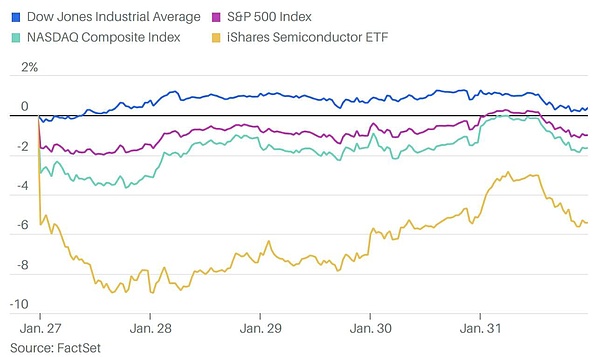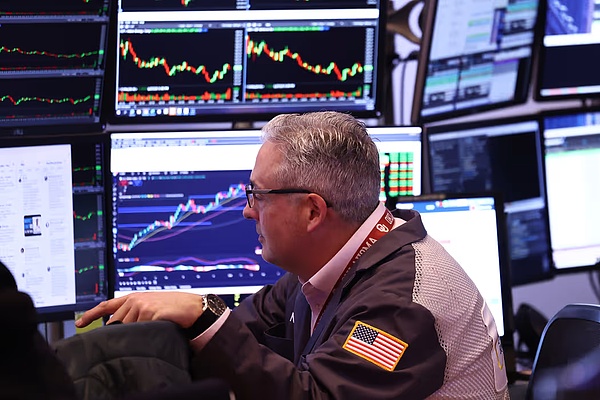Source: Barron's Chinese
The speed at which the new tariffs are arriving is so fast that it is weakening people's hope that Trump is using tariffs merely as a negotiating tool.
Last week, the U.S. stock market was hit by the impact of the DeepSeek chatbot, the financial reports of major tech companies, and the Federal Reserve's policy meeting, and just as the stock market seemed to have weatherly the storm, the threat of tariffs came.
The S&P 500 index fell 1% last week, not a particularly large decline, but the severe impact on the artificial intelligence theme and NVDA stock - one of the key drivers of the U.S. stock market rally - should still be a concern for investors.
U.S. stock market performance last week

The market crash on Monday (January 27) reflected a sense of anxiety: if DeepSeek can match ChatGPT, the price of artificial intelligence may be much lower than previously expected. This is a potential boon for users, but a blow to the large tech stocks that have invested billions of dollars in their own projects, and a blow to the notion that the U.S. is leading the world in artificial intelligence.
This is a huge shift, though how much change it will bring remains to be seen. Wedbush analyst Dan Ives wrote in a research report that "tech investors believe DeepSeek will dramatically change the $2 trillion AI spending expected over the next three years, and we are still shocked that they would think that way."
Investor focus then almost immediately shifted to the earnings reports of Meta Platforms (META), Tesla (TSLA), Apple (AAPL) and Microsoft (MSFT). They did their best to reassure the market, with the first three companies succeeding and the last one failing. Overall, however, the comments from tech company management provided some comfort to investors, and many even saw a positive side.
While investors are concerned about the dominance of Silicon Valley's AI titans, the S&P 500 index was essentially flat as of last Thursday's close: the index did not fall back to the low reached on Monday, with 333 components rising and 169 falling. Ned Davis Research strategist Ed Clissold said, "Short-term breadth stability is a sign of market strength."

Meanwhile, Sevens Report president Tom Essaye pointed out that economic data has also been performing well. He wrote in a research report that "Q4 GDP data was slightly soft, but not particularly soft, with consumer spending remaining strong, putting the U.S. economy in a 'Goldilocks' state." The Federal Reserve, which was in a wait-and-see mode, announced after its two-day meeting that it would keep interest rates unchanged, which also did not have a major impact on the stock market.
However, Washington, D.C. is not calm, and whether the stock market can continue to rebound is not a certainty. Last Friday, U.S. President Trump reiterated that he would impose a 25% tariff on Mexico and Canada, turning a pleasant rebound into a decline.
Starting February 4, the U.S. will impose a 25% tariff on goods imported from Mexico and Canada, a 10% tariff on energy products imported from Canada, and an additional 10% tariff on China.
The speed at which the new tariffs are arriving seems to be weakening people's hope that Trump is using tariffs largely as a negotiating tool. The U.S.'s new tariffs have already provoked retaliatory threats from other countries, and Trump has also threatened to impose tariffs on goods imported from the European Union.
ING economist Inga Fechner wrote in a research report that "nearly half of U.S. imports will be affected by higher tariffs, which could disrupt supply chains and severely impact the economies of the U.S., Canada and Mexico. Industries deeply integrated into the U.S. supply chain, such as automotive and manufacturing, will face rising costs and supply disruptions."
Capital Economics senior market economist James Reilly wrote in a research report that "U.S. trade policy is back in the headlines, and this is not going to stop here."
Perhaps it's time for investors to step aside for a while.







